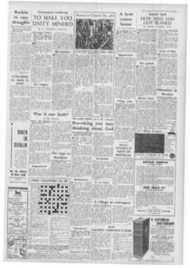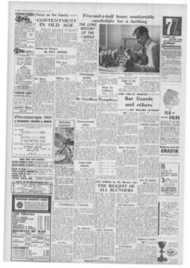Page 8, 29th January 1960
Page 8

Report an error
Noticed an error on this page?If you've noticed an error in this article please click here to report it.
Tags
Share
Related articles
`accra Didn't Help Reds'
Converts Coming Now In Greater Numbers Than Ever
Douglas Hyde's Column
'mau Mau Are Out To
Gifts For Fr. Mcgill
Faith Is Renounced At
' My conscience is clear,' says Joseph Murumbi
`I DID NOT BACK
MAU MAU'
By Douglas Hyde
I AM prepared to go back to Kenya tomorrow to stand trial if the Government has any charges to bring against me." This is what Mr. Joseph Murumbi told me when I drew his attention to a damaging statement made about him the other day by Mr. Macleod, the Colonial Secretary.
Mr. Murumbi, a Catholic from Kenya, is well known to Catholic audiences in Britain and as a contributor to a recent Sword of the Spirit symposium on African problems. His name came into the news when the African Nationalist delegates boycotted the Kenya conference last week in support of their demand that Mr. Peter Koinange should be admitted as an adviser.
A compromise solution was later found which enabled the conference to start — one week late. But by that time the Colonial Secretary had described Mr. Koinange as " one of the only two men outside Kenya as having a special responsibility for the unhappy events which led to the emergency in Kenya seven years ago." A Colonial Office spokesman later identified the other of the two Africans referred to as Joseph Murumbi.
A duty
Last April I reported Mr. Murumbi's views in the columns of the CATHOLIC HERALD after I had had a long conversation with him. He expressed his Nationalist opinions with frankness and declared that he believed that African Catholics should identify themselves with their people's national aspirations. "Now," l told him when I met him last week, "you have a duty to yourself and to CATHOLIC HERALD readers to comment on the Colonial Secretary's remarks."
"My conscience is clear," he replied. "If I am accused of being a Nationalist and a spokesman for the African case then I plead guilty and shall be proud to continue to do so. But if I am belatedly now accused of association with Mau Mau then I deny it absolutely. I am ready to stand trial at any time but I am not prepared to go back to Kenya to find myself put inside an internment camp with no trial at all."
He went on to tell me the story of his movements during the period preceding the outbreak of Mau Mau terrorism and during the emergency; he insisted that he was throughout a practising Catholic.
`No evidence'
In 1941, during World War II, he went to Somalia with the British Military Administration, where he worked in the trade department. He remained there until 1950. Then he took work in India and in 1952 went back home to Kenya.
The political temperature of Kenya was quickly rising at that moment. Joseph Murumbi was politically conscious and so before long he went to the offices of the Kenya African Union to offer his services in the Nationalist cause. He was an educated and travelled man, and they needed leaders. He was immediately made secretary.
In that office, one might think, Mr. Murumbi was in a position to know of anything that was going on inside the K.A.U. "I saw no evidence of their planning Mau Mau," he told me. And had they been up to anything subversive I doubt if they would, have taken a new and unknown person immediately into their confidence."
Threat
His brief period of political leadership in Kenya ended the following March, just five months later, when he left his country and came to Britain. When he arrived in London a responsible London paper described him as "an emissary of Mau Mau." But it later retracted when legal proceedings were threatened. In the course of our conversation Mr. Murumbi repeatedly referred to the time of the Mau Mau campaign as "a dreadful period," but said that it could be understood only if it is seen against the background of Kenya's history. During the present Kenya conference he is working with the African Elected Delegates.
blog comments powered by Disqus









